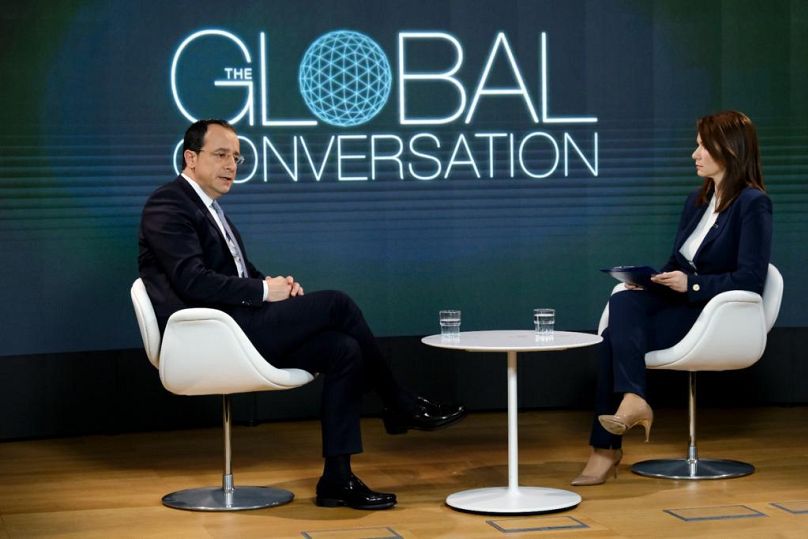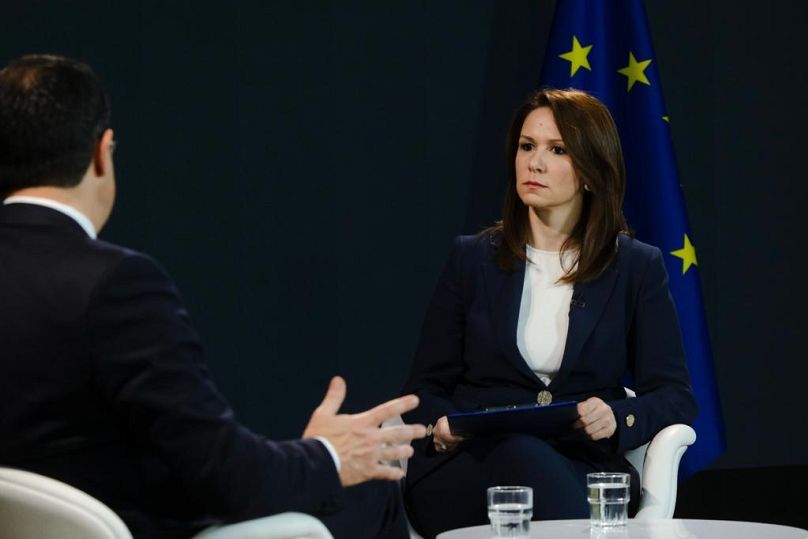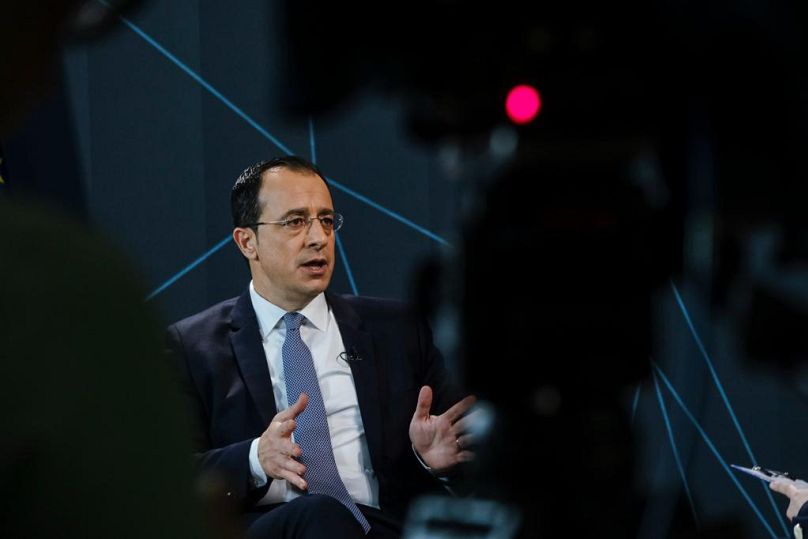Euronews talks to Cypriot President Nikos Christodoulides about tackling the 'Cyprus problem', the upcoming Turkish elections, past ties with Russia, and energy sources in the Eastern Mediterranean.
With the Russian invasion of Ukraine in full swing, the geopolitical landscape has completely changed, as have the priorities of the European Union, and its relations with other countries.
To discuss all this, and the new initiatives on the ongoing dispute between Greek Cypriots in the south and Turkish Cypriots in the north of the country, known as the 'Cyprus problem', Euronews spoke to the new President of the Republic of Cyprus, Nikos Christodoulides, during his first visit to Brussels as President, for the EU Summit.
'The Cyprus problem'
On his trip to the European Union's capital as President of Cyprus, Nikos Christodoulides came armed with a concrete proposal for a more active role for the European Union in resolving the Cyprus problem.
But given that dialogue between Cyprus and Turkey and the Turkish Cypriots has been frozen over the last six years, and considering that Turkey is currently further than ever from the European Union, what is Nikos Christodoulides expecting, and what can the European Union achieve that he could not after all these years?
"When launching an effort to resolve the Cyprus problem, we should always take into account the international situation. It is not ourselves who influence international developments, we are actually affected by international developments.
"And what is the current state of affairs? The current state of affairs is that we have an illegal Russian invasion of Ukraine and we have a European Union, which, yes, pays the price for its decisions which are perfectly correct and we agree and participate in the decision-making process, but develops a leading role, also taking into account the impact of this Russian invasion on other actors in the international system. This is the first dimension: a leading role on behalf of the European Union in a crisis on the European continent.
"The second dimension is the election of a new President of the Republic of Cyprus. The third dimension concerns the elections in Turkey. We have a period until the elections in Turkey, which we should take advantage of, so that dialogue can resume."
Upcoming elections in Turkey
With the Turkish presidential elections scheduled for May, Euronews asked the Cypriot president what changes he envisages, in the event that Recep Tayyip Erdoğan gets re-elected, or if the leader of the main opposition, Kemal Kılıçdaroğlu, becomes Turkey's next president.
"I certainly do not expect radical changes in Turkish foreign policy. At least this is what the history of Turkish foreign policy shows over time. But the election of a new president, whether it is Mr Erdogan or the leader of the current opposition still brings a new situation," Christodoulides explained.
"And, I repeat, the important thing is to make use of this period, and that is what we have agreed with the three presidents of the EU institutions, to create the conditions immediately after the elections in Turkey, to resume talks on the basis of the agreed framework. Because, more than anyone else, we want an end to the occupation and the reunification of our homeland," he added.
How does Christodoulides propose the EU tackles the 'Cyprus problem'?
Given that the Cypriot president wishes for EU institutions to take the lead in dealing with tensions in Cyprus, Euronews asked Nikos Christodoulides if he sees this as putting the Cyprus problem in the context of EU-Turkey relations.
"There are two aspects of our proposal. The first is about the need to break the deadlock. We are not in the talks yet, but the first attempt is about breaking the deadlock to get the talks back on track. Here, we need the European Union's leading involvement.
"But always in the context of the United Nations. We are not attempting to take the Cyprus issue away from the United Nations. On the contrary, the United Nations and the framework of the resolutions are our safeguards in the pursuit of our objective.
"But in order to break the deadlock, we believe that the European Union, through the appointment of a political official, through the actions of the institutions themselves, can support us to achieve this goal. And this is the first aspect of our proposal, it’s what we’re focusing on and aim to achieve immediately after the elections in Turkey.
"With the resumption of dialogue comes the second part of the proposal. A very specific aspect of our proposal is the technocratic support for the talks as soon as they resume."
Cyprus' historic ties with Russia
The Republic of Cyprus has historically had very good relations and strong ties with Russia in the past. Indeed, many aspects of this were severely criticised by Europe. But where do relations between the two countries stand today?
"Yes, there were historically strong ties with the Russian Federation, especially at the level of the people of the two countries. There was also an important dimension concerning the Cyprus issue and the fact that the Russian Federation is a permanent member of the Security Council, but the reality today is clearly different.
"The Republic of Cyprus will in no way escape the unanimous decisions of the European Union, in which I repeat, we also participate," said the Cypriot president.
Does Cyprus support EU sanctions against Russia?
"Sanctions are a tool that is rightly used by the European Union. Where we may have a problem, is the implementation of sanctions, not just by Member States, but also by all those who are connected in one way or another with the European Union.
When asked to clarify his position on the sanctions, Christodoulides told Euronews, "Of course [I support them]"
The Eastern Mediterranean: An alternative to Russian energy?
As Europe looks to cut its dependence on Russian energy, Euronews asked Nikos Christodoulides what role Cyprus could play in this and if he had seen any increased interest from the European Union towards the Eastern Mediterranean.
"There is interest. There is interest that has been expressed before we took over the governance of the country. We have previously had some interest. I want to say things as they are, and it is this prospect of the famous gas corridor of the Eastern Mediterranean, through a leading role of the European Union and cooperation of the countries in the region.
"Yes, the Eastern Mediterranean can be developed as an alternative energy corridor for the European Union. In fact, according to the estimates of experts that know this matter better than me, the Eastern Mediterranean can cover up to 15% to 16% of the needs of the European Union over the next 25 years."
"We have found gas and there are ongoing activities by companies located in the Exclusive Economic Zone of the Republic of Cyprus.
"This is an issue that we discussed with the ministerial council, especially with the Minister of Energy about the need, after consultation with companies, to go out in public, to tell the people the truth.
This gas will be used in that exact period of time. Until then, we will proceed to the stage of exploitation, because what worries me, is that in 5-10 years, in the context of the green transition, these reserves may not be in a position to be used."













